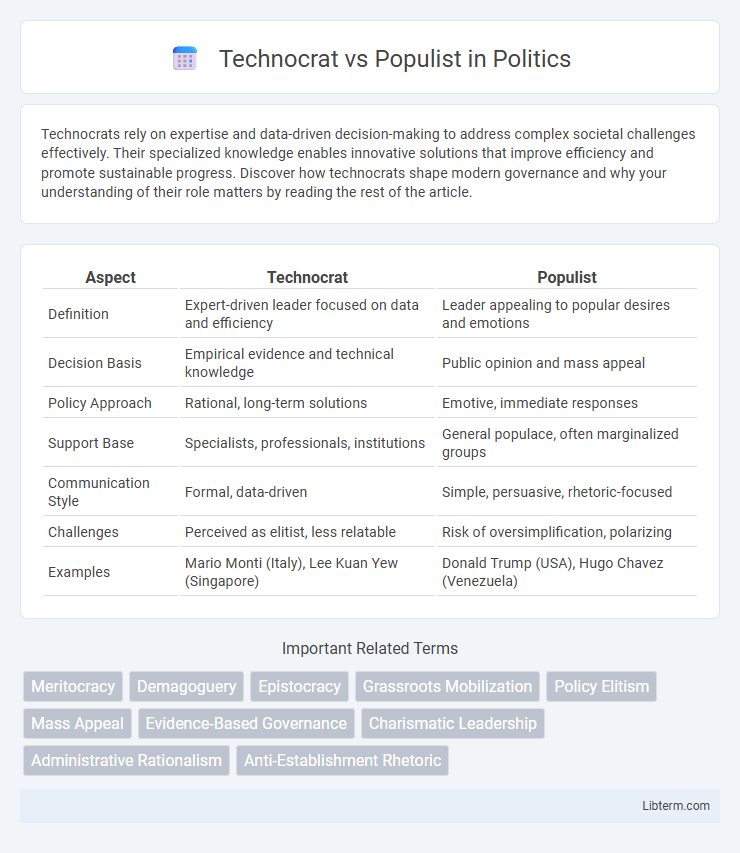Technocrats rely on expertise and data-driven decision-making to address complex societal challenges effectively. Their specialized knowledge enables innovative solutions that improve efficiency and promote sustainable progress. Discover how technocrats shape modern governance and why your understanding of their role matters by reading the rest of the article.
Table of Comparison
| Aspect | Technocrat | Populist |
|---|---|---|
| Definition | Expert-driven leader focused on data and efficiency | Leader appealing to popular desires and emotions |
| Decision Basis | Empirical evidence and technical knowledge | Public opinion and mass appeal |
| Policy Approach | Rational, long-term solutions | Emotive, immediate responses |
| Support Base | Specialists, professionals, institutions | General populace, often marginalized groups |
| Communication Style | Formal, data-driven | Simple, persuasive, rhetoric-focused |
| Challenges | Perceived as elitist, less relatable | Risk of oversimplification, polarizing |
| Examples | Mario Monti (Italy), Lee Kuan Yew (Singapore) | Donald Trump (USA), Hugo Chavez (Venezuela) |
Understanding Technocracy: Principles and Origins
Technocracy is a system of governance where decision-makers are selected based on expertise, especially in science, engineering, and economics, emphasizing evidence-based policies over political ideology. Originating in the early 20th century during the Progressive Era, technocratic principles advocate for rational planning and efficient management of society's resources. This model contrasts with populism by prioritizing specialized knowledge and technical skills to address complex societal challenges.
Defining Populism: Core Beliefs and Appeal
Populism centers on the belief that society is divided into two antagonistic groups: the "pure" people and the "corrupt" elite, advocating for the will and interests of ordinary citizens against established power structures. Populists often emphasize direct democracy, social justice, and responsiveness to popular demands, leveraging rhetoric that resonates with disenfranchised or marginalized groups. This approach appeals to voters seeking greater representation and economic or political empowerment, often contrasting with technocratic governance that prioritizes expertise and institutional stability.
Technocrat vs Populist: Key Differences Explained
Technocrats prioritize expertise and data-driven decision-making, emphasizing specialized knowledge in governance and policy implementation. Populists focus on appealing to popular will and emotion, often simplifying complex issues to resonate with the general public and mobilize support. The key difference lies in technocrats valuing rationality and expert input, while populists prioritize mass appeal and direct connection with the people.
Historical Evolution of Technocracy and Populism
The historical evolution of technocracy traces back to the early 20th century with the emergence of experts advocating for decision-making based on scientific knowledge and technical expertise, particularly during the Progressive Era and the Great Depression. Populism, contrastingly, has roots in 19th-century agrarian movements like the People's Party in the United States, emphasizing the sovereignty of common people against elite institutions. Both movements have periodically surged in response to economic crises and political dissatisfaction, shaping governance by highlighting the tension between expert-driven administration and popular sovereignty.
Governance Styles: Evidence-Based vs. Popular Will
Technocrat governance emphasizes evidence-based decision-making, relying on expertise, data, and scientific methods to formulate policies that address complex issues efficiently. Populist governance prioritizes the popular will, focusing on direct appeal to the masses and often shaping policies based on public opinion and majority desires, sometimes at the expense of technical feasibility. The tension between these styles highlights the balance between informed, rational planning and democratic responsiveness in political leadership.
Case Studies: Global Examples of Technocrats and Populists
Technocrats have shaped policy in countries like Singapore, where Lee Kuan Yew's expertise-driven governance transformed the nation into a global economic hub through pragmatic, data-driven decisions. In contrast, populists like Brazil's Jair Bolsonaro leverage mass appeal and nationalist rhetoric to mobilize support, often challenging established institutions and prioritizing popular sentiment over technocratic policy frameworks. These case studies illustrate the divergent impacts of technocratic competence and populist mobilization on democratic governance and policy outcomes worldwide.
Strengths and Weaknesses of Technocratic Leadership
Technocratic leadership excels in data-driven decision-making, relying heavily on expertise and empirical evidence to solve complex problems efficiently. Its strength lies in fostering innovation and promoting policies grounded in scientific analysis, though it often struggles with limited public engagement and perceived detachment from popular opinion. This approach risks alienating stakeholders who prioritize emotional appeal and broad societal values over technical proficiency.
Populist Governance: Opportunities and Pitfalls
Populist governance often capitalizes on widespread public dissatisfaction by promoting direct engagement with the "common people" and prioritizing their immediate needs, which can lead to increased political mobilization and responsiveness. However, such governance risks oversimplifying complex policy issues, fostering divisiveness, and undermining institutional checks and balances through charismatic leadership and anti-elitist rhetoric. Balancing populist appeal with sustainable policy frameworks remains a critical challenge to avoid governance pitfalls like economic mismanagement and erosion of democratic norms.
Societal Impacts: Trust, Reform, and Social Cohesion
Technocrats, with their emphasis on expertise and data-driven policies, often build trust in institutions by promoting effective reforms that address complex societal issues. Populists, prioritizing popular sentiment and direct appeals to the public, can enhance social cohesion among specific groups but may also deepen divisions and reduce trust in traditional institutions. The balance between technocratic governance and populist engagement significantly shapes societal trust, the scope and success of reforms, and overall social cohesion.
Future Trends: Technocrats, Populists, and Democracy
Future trends suggest an increasing tension between technocrats, who advocate for evidence-based policymaking driven by expert analysis, and populists, who mobilize popular sentiment and often challenge established institutions. As democratic systems evolve, the balance between technocratic governance and populist influence will shape policy effectiveness, public trust, and political stability. Emerging technologies and data-driven decision tools may empower technocrats, while social media platforms continue to amplify populist voices, complicating the democratic process.
Technocrat Infographic

 libterm.com
libterm.com